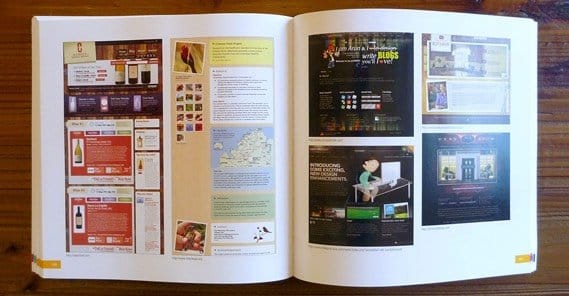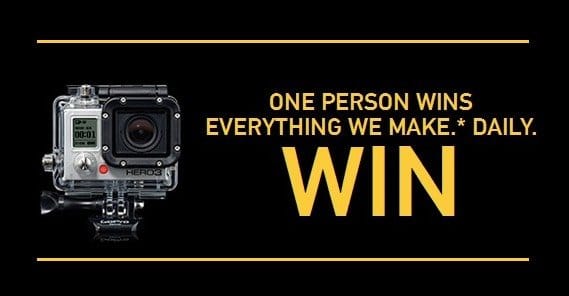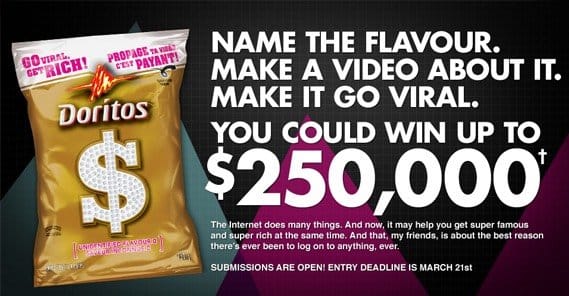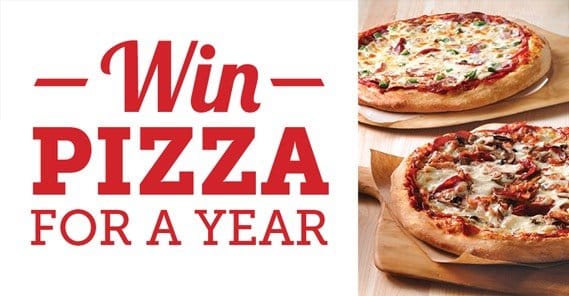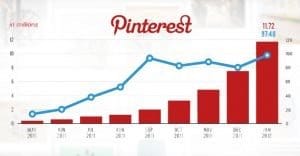20 Cool Prizes You Can Give Away in a Contest

Contests on a blog or social media are an interesting situation. Some of the most successful contests out there grab millions of people and global attention, but then, they’re also the sort of contests that run for six months and have prizes valued at tens or hundreds of thousands of dollars. These are the sorts of prizes that the average person finds so attractive, so valuable, that they almost have to enter. It’s like the lotto, but you don’t have to pay for a ticket.
Of course, what brand out there has that kind of budget for a contest? Nabisco, Coke, Apple, Google; sure, these sorts of companies can swing it. The rest of us, the little guys, we have to make do with much smaller contests prizes. We’re talking about $25 gift cards, not $25,000 cruises.
There’s one guiding principle for contest prizes that I need to drum into the heads of everyone who runs a contest online, though. That principle, that rule, that law, is this: Never give away something that has nothing to do with your business.
Why is this? Well, the idea with a social media contest is to give a small prize as an incentive for getting people to like your page, follow your profile, or otherwise engage with you. You’re paying for engagement, you’re just doing it in a distributed manner.
Now, who do you want engaging with your page, following your profile, or signing up for your mailing list? You want fans. You want the people interested in your products. You want the people who might go on to buy something later, or who, having already bought something, will be more receptive to future purchases or upsells. You want the people you can eventually sell to, to make your profits.

If you’re giving away a copy of your product, the people who enter your contest are people who want your product. It’s obvious, right? They wouldn’t enter if they didn’t have an interest in the prize. Okay, well, maybe a few people will, under the assumption that they can eBay it later, but that’s a minority.
Now look at a different situation; you’re giving away the new Samsung Galaxy phone. Who is going to enter that contest? Anyone and everyone who wants a free Samsung Galaxy. They want a phone; they don’t care who you are or why you’re giving it away. If you’re anyone other than Samsung or an electronics seller like Best Buy, you’re not getting interested fans out of the contest. You’re just getting people who want a phone.
Always try to give away a prize that is primarily appealing to the demographic you want to reach. That doesn’t mean, though, that you’re limited to just your product. There are a ton of different options, you just need to be a little creative. I’ve put together 20 ideas, but you should consider them inspiration, starters, seeds for brainstorming. They aren’t your only options by far.
#0: Your Product or Service
I’m starting off this list with number zero because giving away your product or a month of your service is the absolute bare minimum baseline option. It’s extremely limited, because it’s only appealing to people who already know about and are interested in your product or service. If you’re offering something more esoteric or exotic, you’re not going to draw in new people. A variation of this offer is a sample size, or a sample pack; 6x 5g lotion bottles instead of your normal 30g offering, for example. Give them a range of options of fragrances or compositions, instead of just one.
#1: Store Credit
Store credit or store-only gift cards are a good option if you’re a retailer or storefront that has a lot of different items on offer.
If you have a stock of 100 items, and you pick one to give away, you’re missing out on the people who want one of the other 99. If you give out a gift card worth the value of that item, people interested in anything you sell whatsoever are going to join. This is also a path for potential upsells later, if your gift card is worth the average value of a product but you have a number of offerings worth more. If your high end products cost $70 and you’re giving away a $50 card, people will think of it like the high end products only costing $20, and they’ll more strongly consider accessories or replacement/service plans.
#2: Advice
As a brand, you’re an expert in your field. If you have sales personnel on staff to handle sales, that means people need to have their questions answered. Sales staff are generally trained to make a sale to please a customer, even if the final purchase isn’t the ideal product for that customer. By offering consulting or advice as a prize, you have the opportunity to go one on one with a potential customer, tailor an offering to their specific situation, and help them with the details. If you please them with something affordable and valuable to them, you’ll have a brand advocate for life.
#3: Upsells
When you sell a camera to a new customer, your website is probably designed to give them suggestions – and your sales staff certainly are. These suggestions will involve upsells. You might not want to give away the camera itself, but a carrying case, an extra lens, a set of cleaning supplies, a tripod, and a light diffuser, you might be much more willing. Give away the cheaper accessories that aren’t valuable without the camera, and people will be more likely to make that purchase they’ve been waiting on.
#4: Featured Publicity
This one is pretty narrow, because you need to have a situation where you have the popularity to make publicity through your company valuable, but you can’t operate on such narrow margins that giving up a slot in your publicity lineup hurts too much.
One good example might be a nightclub. You regularly book bands and events; offer an opening act slot to a local act as a contest prize. The winner gets the opportunity to perform on stage before a packed show, and they get the advantage of your publicity leading up to the event. Unfortunately, this prize is narrow and only works for certain businesses in certain industries.
#5: VIP Treatment
If you offer a service, you can upgrade that service and give the customer personal attention. If you’re an airline, you might run a contest for one of your customers to be upgraded to first class and treated as if they’re flying on your airline’s equivalent to The Residence. This even works if you’re offering a web service; offer a free six months of a dedicated account manager, training, and the top-level enterprise services. Chances are, if you impress the customer, they’ll want to stick around at that level and subscribe.
#6: Themed Collections
There are all sorts of themes you can get into for prize collections. Put together a handful of green products and promote it as a St. Patrick’s Day collection. Put together some pastel and oval items and make it Easter. Christmas is easy. You can even go more exotic with the themes; spring is here, give away a pack of items useful on the beach or during spring cleaning. Winter is coming? Give away a Game of Thrones-themed pack, or just a bunch of survival equipment.
#7: Local Partnerships
Sometimes it’s a good idea to forge a partnership with another local business, one that is complimentary to your own. If you’re a photographer, you might partner with a photography store to give away a basic introductory camera and some lessons on photo taking, composition, and editing. A camping store might partner with a sporting goods store to give away a package of outdoorsy items. As long as you can get a mutually beneficial partnership, it’s a brilliant idea.
#8: A New Item
This works especially well with electronics and with new lines of clothing. You can give away one of the first copies of something new, hot off the presses.
People compete to get into software betas, being given an entire product is a great incentive. You’d be surprised at how many people will enter contests for something they don’t even particularly want, just to be one of the first to have it. Then, who knows? Maybe they’ll love it and want more.
#9: An Exclusive Item
Along the same lines as a new item before it goes on sale, you can give away something that won’t go on sale at all. Special in-house beta items, prototypes, or even limited-run merch are all good ideas for special prizes. Just make sure you’re not giving away something that is illegal for a consumer to own, or something that could be potentially dangerous. Sometimes the prototypes aren’t the production items because of flaws that can be dangerous, after all.
#10: A Supplementary Service
A store that sells maternity clothing has an audience of pregnant women. A supplementary product for them might be a contract with a nanny service and a partnership with a restaurant for a nice night out. They know expectant mothers are going to have a hard time of it their first year, so giving them a night off each month for a year can be a great boon.
#11: A Consolation Prize
This one doesn’t quite fall under contests so much as offers. It’s often a good idea to offer a simple incentive for the contest entry, even if the user doesn’t win. Maybe you make a grand prize a major item from your store, but you give everyone who enters a simple 5% discount on a single order. This helps you drum up a lot of sales, particularly from people who want to win but expect they won’t and go to buy anyways. Just make sure that you’re willing to handle a return if they buy the prize and then actually win it.
#12: Customized Prizes
Normally, for example, a company that prints shirts will carefully study the potential designs they create in order to make sure they’re producing items that have broad appeal.
A contest for a shirt printer, then, might be a custom design. Get your shirt printed, regardless of what design you have in mind! You might vary this up, too; offer professional services to turn concept into design. You can also pay for the design, give the designer a free shirt, and sell the design later.
#13: Company Merch
It’s not uncommon for companies to have branded merch available, generally for trade shows or for other exclusive venues and events. If you have some excess shirts or something, you can give them away as part of a prize. You can also make specific celebratory merch, like Logitech did when they gave away shirts when they sold their 500 millionth mouse.
#14: Fan Desires
When you can’t think of a good prize, why not just offer what the fans want? Post that you’re willing to give away anything you offer, and ask fans to suggest what they want. Then pick a random – or semi-random – winner and give them the product they desire. Half the time you’re going to get a much happier winner because they got exactly what they want, plus it’ll work out to be cheaper than using something valuable to entice more people.
#15: Extreme Rewards
Alright, so maybe you’re running a huge contest. You can do something clever, like raise the prices on everything in your store by a few cents in order to finance some big prize.
Promote the contest for a long time and get a lot of hype for it. Offer a vacation, a cruise, an expenses-paid trip, or even just a big cash reward. I don’t recommend pure cash, of course, but sometimes it can be relevant. For example, offer a big cash reward, and the services of your financial institution to manage it.
#16: Numerical Relevance
Give away a lot of something, in a quantity that makes sense. For example, the shirt maker Qwertee gave away 1,000 shirts every week in an attempt to reach 100,000 followers. They made it, and then some, and part of it was because of the sheer amount of product they were giving away. It probably hurt some, financially, but their increased audience more than made up for it over the coming years.
#17: A Brand Spotlight
Dove ran a contest a few years back where the entrants were asked to submit their camera-happy moments involving a Dove product in some way. The idea was to showcase Dove users as happy and proud individuals. The winner became a Dove model and brand advocate for an ad cycle; something potentially valuable for a resume.
#18: A Year of Goodies
This one combines many of the above and turns your winner into a “subscriber” of a LootCrate-style box of goodies each month.
Give away special boxes to 10 or 100 winners, something of the sort, filled with reasonable themed prizes. It’s like taking the holiday themes and running with them.
#19: Random Value
You can offer random grab bags of prizes from your store. You might have items worth $5, you might have items worth $50, you might have an item worth $500 as a special hidden prize. The thrill of not knowing what you’re going to get will keep people entering. You can also sell grab backs, and “guarantee” that their value is more than what the user pays, with the chance for something much more valuable.
#20: Generic Items
This is where I tell you that, sometimes, it’s alright to offer something like cash or a Samsung Galaxy as a prize. The trick is, you can ONLY do this when your contest is branded. You can’t have a simple “register for our mailing list to win” contest, here. You need a “submit a Vine of you interacting with our product” contest. This way you guarantee that the people entering are actually interested in your brand, because they have your product.
 ContentPowered.com
ContentPowered.com

